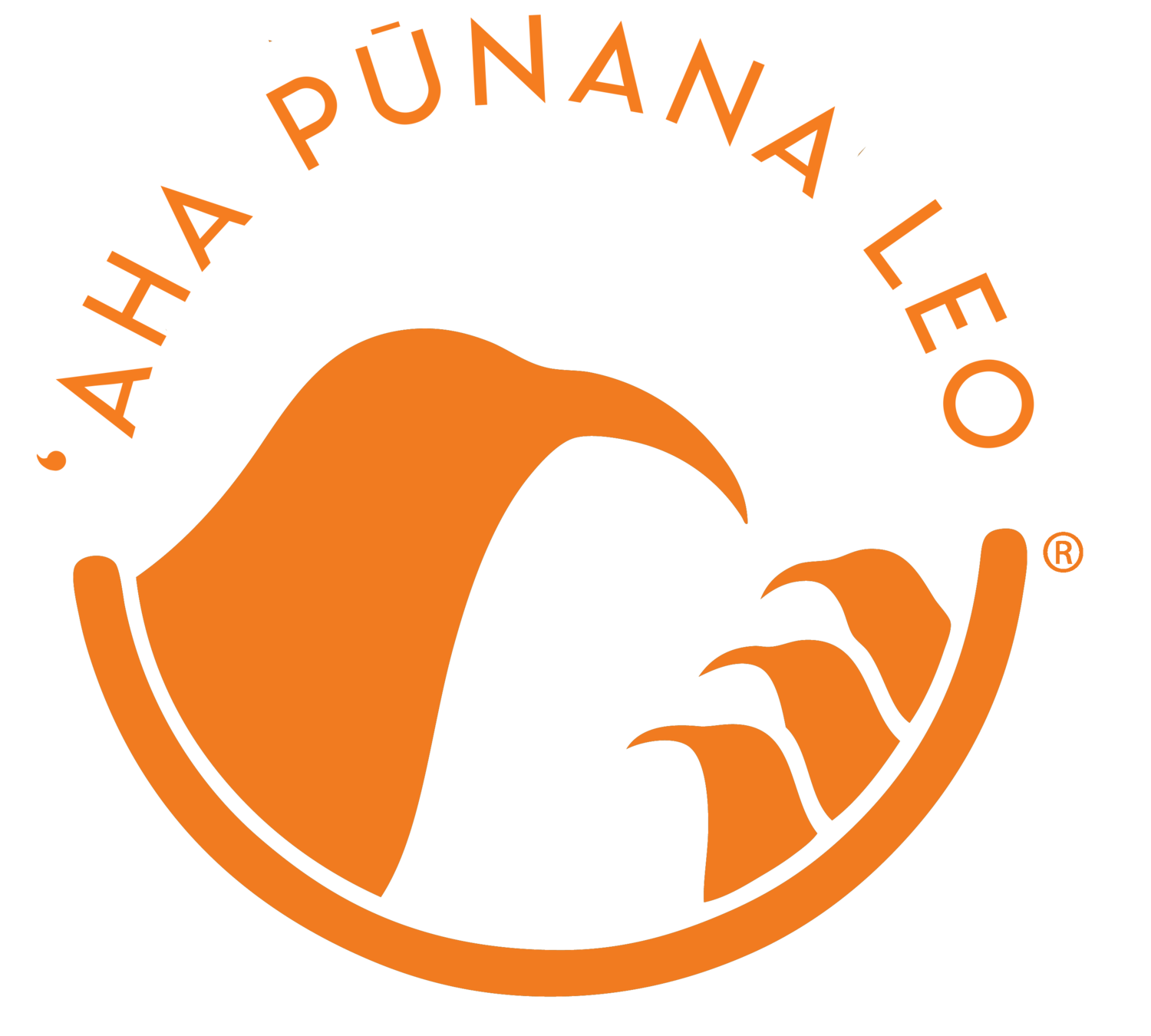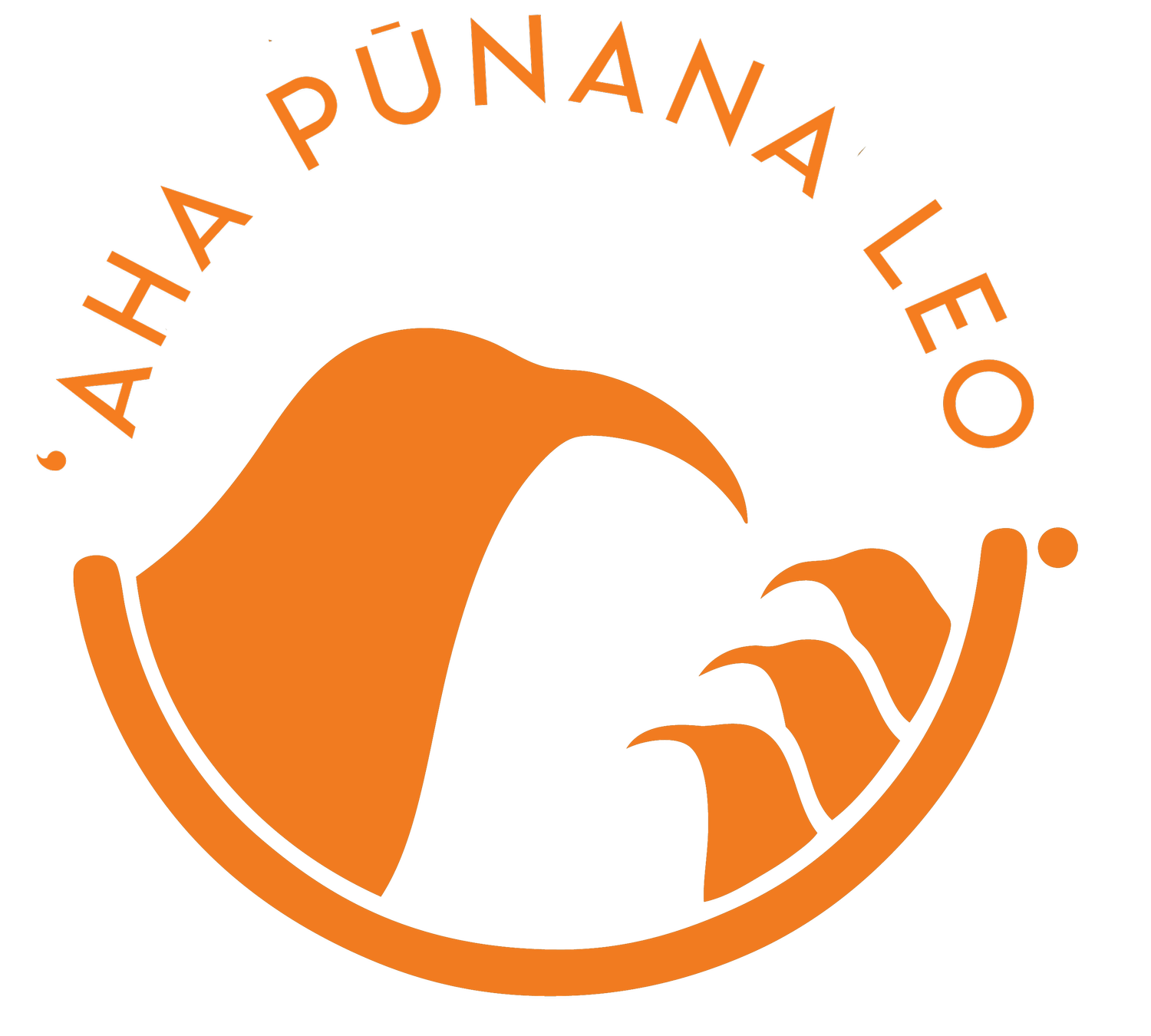
Our History
Front row, L-R: Makalapua Alencastre, the late ʻĪlei Beniamina and Larry Kimura. Back row, L-R: Hōkūlani Cleeland, Kauanoe Kamanā, Kīʻope Raymond and Pila Wilson.
In January 1983, a group of Hawaiian language educators met to discuss strategies to perpetuate the language. From speaking with elders, they knew that raising children in an environment where Hawaiian was the ordinary language of interaction was central to survival of the language. The key would be to re-establish Hawaiian Medium Education schools that existed during the Monarchical Period. They focused their efforts to nurture a new generation of speakers that would be able to describe the world through the lens of their language and culture, as well as master English and other languages using methods that had proven effective in Europe. Thus began the Pūnana Leo preschool and a reemergence of a Hawaiian philosophy of education, now known as the Kumu Honua Mauli Ola.
Pūnana Leo means “nest of voices” and depicts the dominant learning method in these centers as students are “fed” solely their native language and culture much like the way young birds are cared for in their own nests. The first of these preschools was established in Kekaha, Kaua‘i in August 1984. The following year, schools were established in Hilo, Hawai‘i and Honolulu, O‘ahu and continued to spread to other islands thereafter.
‘Aha Pūnana Leo is closely tied to the Māori Kōhanga Reo movement in New Zealand. Indeed, the name Pūnana Leo, which is equivalent to the Māori term Kōhanga Reo, honors those connections and the inspiration provided by the Kōhanga Reo.
Today, a complete preschool through doctoral-level system of education in the state of Hawai‘i is taught entirely through Hawaiian.

Timeline
L-R ʻO Mehana Evans, Kūhaʻo Zane, a me Kuʻulei Kalani-Maskell nā keiki me Tūtū Lee Hong.
1983 | ‘Aha Pūnana Leo, a grassroots organization dedicated to reviving ‘Ōlelo Hawai‘i (the Hawaiian language), is established by group of Hawaiian language educators from across the state.
1984 | The first ʻAha Pūnana Leo Preschool Hawaiian Medium Education program is established in Kekaha, Kaua‘i, followed by 11 more sites statewide over the next two decades.
1986 | After years of advocacy, ‘Aha Pūnana Leo successfully works with the Hawai‘i State Legislature to pass a bill removing a 90-year ban on teaching in Hawaiian in public and private schools.
1987 | ‘Aha Pūnana Leo works with the Hawai‘i State Department of Education to develop curriculum for the first elementary indigenous language immersion classes in the U.S., establishing the first Kaiapuni schools at Keaukaha Elementary in Hilo and Waiau Elementary in Pearl City.
1990 | The President signs the Native American Languages Act after ‘Aha Pūnana Leo and other Native American communities throughout the U.S. advocate to save around 200 remaining Native American languages from extinction.
2005 | ‘Aha Pūnana Leo expands its Hilo and Wai‘anae sites to offer the Hi‘ipēpē Infant Program. Open to keiki from nine-months to three-years-old, the program targets ‘ohana (family) interested and committed to making ‘ōlelo Hawai‘i their primary language at home.
2009 | ‘Aha Pūnana Leo launches its Niuolahiki Distance Learning Program, which provides a flexible and affordable way for anyone to learn ‘ōlelo Hawai‘i through an online, self-directed Hawaiian Medium Education curriculum. The program has received approximately 3,000 students from across the world.
2010 | ‘Aha Pūnana Leo establishes the Hale ‘Ōiwi outreach project to assist Native American communities and organizations develop language curriculum and outreach programs
2014 | October 24th is proclaimed ‘Aha Pūnana Leo Day in Hawai‘i after the program receives the world’s first early education accreditation by the World Indigenous Nation’s Higher Education Consortium (WINHEC).
2016 | After ‘Aha Pūnana Leo’s first visit to the United Nations (UN) with other subject matter experts from across the world, the United Nations General Assembly proclaims 2019 as the International Year of Indigenous Languages, to raise awareness about the consequences of the endangerment of indigenous languages. Through its Hale ‘Ōiwi outreach project, ‘Aha Pūnana Leo establishes the Mokuola Honua Global Center for Indigenous Language Excellence in partnership with University of Hawai‘i at Hilo’s Hawaiian Language College, to serve as a gathering place to foster collaboration on a wide range of indigenous issues and strategies.
2018 | ‘Aha Pūnana Leo celebrates its 35th anniversary with 6,000 Pūnana Leo preschool and Hi‘ipepe Infant Program alumni and more than 3,000 Niuolahiki Distance Learning Program students from around the world.
2019 | Investing more than $100,000 and 100 hours in professional development for its staff, ‘Aha Pūnana Leo officially launched the Aukukui Professional Development program in partnership with Ka Haka ‘Ula o Ke‘elikōlani college to provide Hawaiian Medium Education teacher certifications.
2023 | Kaʻau Hua, Kaʻau Ola. The ʻAha Pūnana Leo has reached a milestone of 40 years, a kaʻau makahiki, in Hawaiian language revitalization to reestablish the position of the Hawaiian language as the original/source language of Hawaiʻi.
ʻAha Pūnana Leo seeks re-accreditation from the World Indigenous Nation’s Higher Education Consortium (WINHEC).



